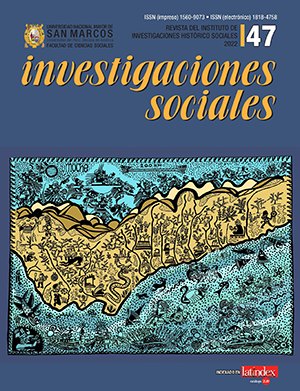Hispanic american independence: New perspectives
DOI:
https://doi.org/10.15381/is.n47.23877Keywords:
Independence, Spanish America, Austria, Brazil, DiplomatsAbstract
Research on Hispanic American independence usually uses documentation from Spanish and Latin American archives, not taking into account that of those European countries considered outside the orbit of the Hispanic monarchy. The funds of the Austrian State Archives allow us to analyze the theme of the independence using the correspondence of the diplomatic representatives of the Austrian empire stationed in Spain and Brazil. The reports, sent to Vienna between 1808 and 1825, at a time when virtually all of Europe was mired in war, open a new perspective in the investigation on the independence activities. While the documentation of the Austrian representatives in Spain offers the possibility of analysing the American independence movement from within the Spanish crown itself, the reports coming from Brazil allow the access to information from those Austrian diplomats who were geographically closer to the events in South America and who informed to Vienna about the Portuguese position on the insurgence of the Spanish colonies, an aspect little dealt with until now by the historiography. These reports offer the possibility of taking into account new aspects that would enrich the research on Spanish American independence.
Downloads
Published
Issue
Section
License
Copyright (c) 2022 Milagros Martínez-Flener

This work is licensed under a Creative Commons Attribution 4.0 International License.
AUTHORS RETAIN THEIR RIGHTS:
a. Authors retain their trade mark rights and patent, and also on any process or procedure described in the article.
b. Authors retain their right to share, copy, distribute, perform and publicly communicate their article (eg, to place their article in an institutional repository or publish it in a book), with an acknowledgment of its initial publication in Investigaciones Sociales.
c. Authors retain theirs right to make a subsequent publication of their work, to use the article or any part thereof (eg a compilation of his papers, lecture notes, thesis, or a book), always indicating the source of publication (the originator of the work, journal, volume, number and date).






